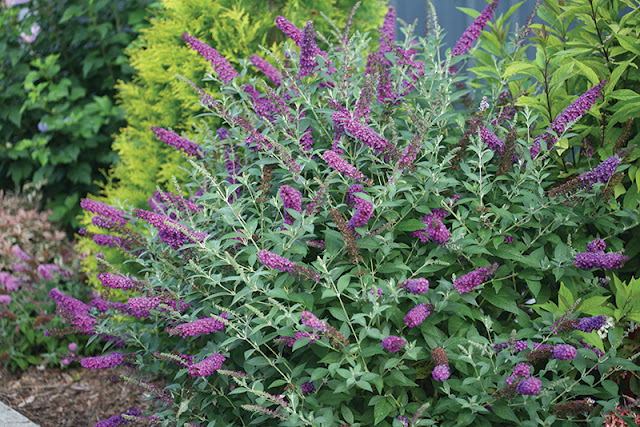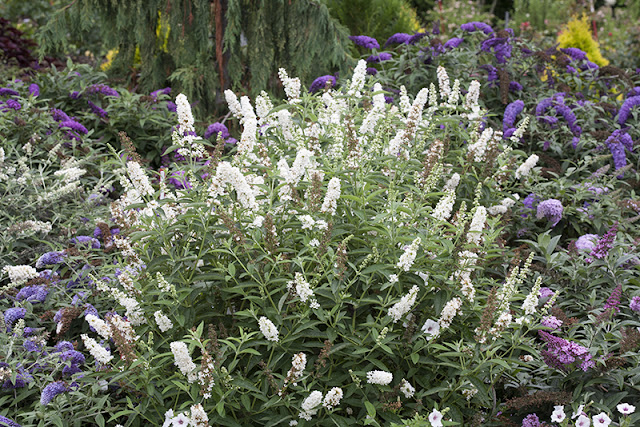With names like 'Miss Ruby' and 'Miss Violet', you would expect these varieties to be a bit more genteel than the hoolligan Buddleia of the past. And they are: compact, so they don't overwhelm the garden, and non-invasive so they don't produce unwanted seedlings.
Lest you think that refined Buddleia with good etiquette are missing the vibrant color and heady fragrance of traditional cultivars, rest assured that these well-bred ladies have all of the passionate hues and butterfly appeal of the old-fashioned plants. In fact, I'd say that the color is even better.
 |
| 'Miss Violet' butterfly bush |
'Miss Violet' has rich, Welch's grape juice purple flowers. Unlike grape juice, it doesn't stain, so you can let your three year old walk around with it.
 |
| Color comparison for 'Miss Ruby', 'Royal Red', and 'Miss Molly': 'Miss Molly' is the reddest Buddleia available. |
'Miss Ruby' and 'Miss Molly' push the red color as far as we've seen Buddleia go. 'Miss Ruby' is a delightful fuchsia, while 'Miss Molly' is a dark magenta-sangria red. The red color will be more intense in warmer climates. And if you need something cool and refreshing for a summer evening garden, check out 'Miss Pearl' with her crisp white blooms.
 |
| 'Miss Pearl' butterfly bush |
All are hardy to USDA Zone 5 and will do best in full sun. They grown 4-5' tall and wide, and have nice full habits that are very attractive both in containers and in the garden.
Secondly, USDA Zone 5. You can grow them further north as annuals. If you're growing them in a container, consider them to be an annual as well unless you are in a very mild (Zone 6 or better yet 7) climate.
And then there's heat. We've been having some very warm weather here in West Michigan, and while the people and my poor dog aren't enjoying it, the butterfly bushes are loving every minute.
Buddleia has some wonderful qualities, like the aforementioned affinity for heat. While other plants are wilting, these characters are strutting their stuff in the summer landscape. Then there's the fragrance: when you walk towards a planting of Buddleia it's like being approached by a perfume demonstrator at the department store. Only with the plant there's no judgement of your grubby gardening clothes and no pressure to buy. And then there's the deer resistance. Yes, they attract butterflies and don't attract deer. What a combination!
The basics of Buddleia
First off, full sun and well-drained soil. There's no way around these two requirements. If you don't have well-drained soil, consider growing them in a container. The dwarf Lo & Behold® or Pugster® plants are good choices for container plantings.Secondly, USDA Zone 5. You can grow them further north as annuals. If you're growing them in a container, consider them to be an annual as well unless you are in a very mild (Zone 6 or better yet 7) climate.
And then there's heat. We've been having some very warm weather here in West Michigan, and while the people and my poor dog aren't enjoying it, the butterfly bushes are loving every minute.
Buddleia has some wonderful qualities, like the aforementioned affinity for heat. While other plants are wilting, these characters are strutting their stuff in the summer landscape. Then there's the fragrance: when you walk towards a planting of Buddleia it's like being approached by a perfume demonstrator at the department store. Only with the plant there's no judgement of your grubby gardening clothes and no pressure to buy. And then there's the deer resistance. Yes, they attract butterflies and don't attract deer. What a combination!
 |
| 'Miss Ruby' butterfly bush |
In some areas they can be a nuisance, but new non-invasive varieties like the 'Miss' and Lo & Behold® series are sterile and so better choices for these areas. They are permitted for sale in Oregon, so our friends in the Northwest can enjoy Buddleia too!
Plant of the Week is written by Jane Beggs-Joles



